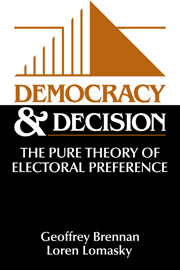Book contents
- Frontmatter
- Contents
- Preface
- 1 Ethics, politics, and public choice
- 2 The logic of electoral choice
- 3 The nature of expressive returns
- 4 The analytics of decisiveness
- 5 The theory of electoral outcomes: implications for public choice theory
- 6 From anecdote to analysis
- 7 Interpreting the numbers
- 8 Consensus, efficiency, and contractarian justification
- 9 Paternalism, self-paternalism, and the state
- 10 Toward a democratic morality
- 11 Constitutional implications
- Bibliography
- Index
3 - The nature of expressive returns
Published online by Cambridge University Press: 05 June 2012
- Frontmatter
- Contents
- Preface
- 1 Ethics, politics, and public choice
- 2 The logic of electoral choice
- 3 The nature of expressive returns
- 4 The analytics of decisiveness
- 5 The theory of electoral outcomes: implications for public choice theory
- 6 From anecdote to analysis
- 7 Interpreting the numbers
- 8 Consensus, efficiency, and contractarian justification
- 9 Paternalism, self-paternalism, and the state
- 10 Toward a democratic morality
- 11 Constitutional implications
- Bibliography
- Index
Summary
The pyro-technics of party management and party advertising slogans and marching tunes are not accessories. They are the essence of politics.
Joseph Schumpeter, Capitalism, Socialism and DemocracyIntroduction
The argument developed in the preceding chapter depends crucially on a distinction between instrumental and intrinsic elements in preference revelation. To the economist at least, and possibly to others, any such distinction may seem somewhat bizarre. The notion that preference revelation can be a consumption activity generating benefits in and of itself (and distinct from the benefits derived from the consumption of the object chosen) is hardly an integral part of the standard theory of consumer behavior. In that standard account, the individual chooses A over B because he prefers A over B, not because he prefers to prefer A over B: The individual is presumed to derive utility directly from the consumption of goods and services, rather than from having a particular utility function. It may well seem excessively contrived, and even rather suspicious, to invoke any such possibilities. Consequently, while intrinsic elements in preference revelation may be included for reasons of logical completeness in a purely theoretical exposition, there comes a point at which we must indicate why it is reasonable to suppose that such intrinsic elements are present and what they consist of.
- Type
- Chapter
- Information
- Democracy and DecisionThe Pure Theory of Electoral Preference, pp. 32 - 53Publisher: Cambridge University PressPrint publication year: 1993



